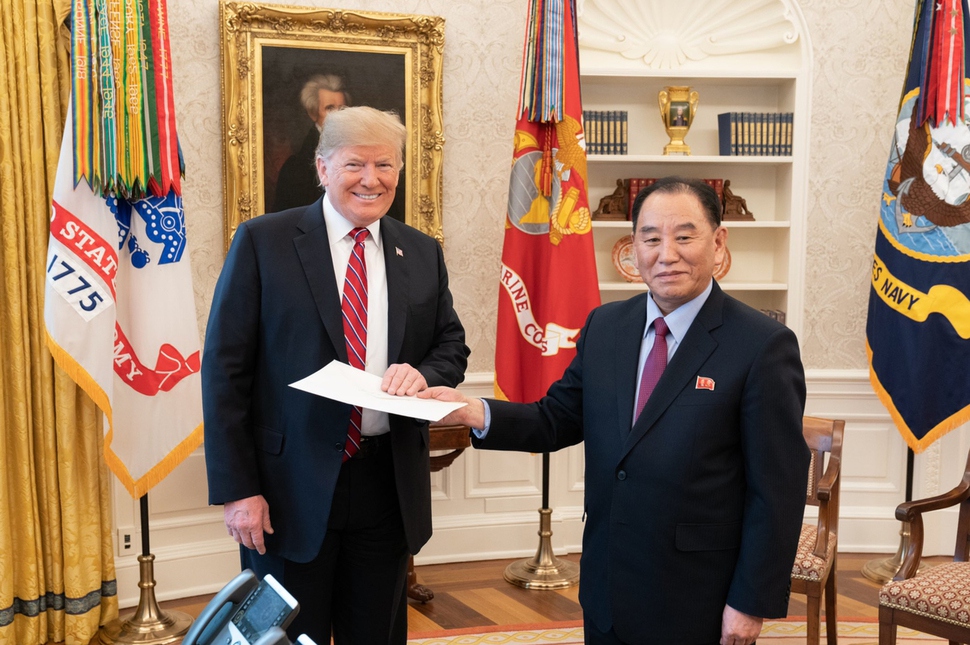Posted on : Jan.22,2019 17:23 KST
Modified on : Jan.22,2019 17:29 KST
 |
|
US President Donald Trump receives a letter from North Korean leader Kim Jong-un via WPK Vice Chairman Kim Yong-chol at the White House on Jan. 19. (Dan Scavino’s Twitter account)
|
As the outlines of the upcoming second North Korea-US summit begin to take shape, South Korean President Moon Jae-in has declared his readiness to play the role of mediator. Hearing from Washington, DC, on Jan. 21 that both North Korea and the US are satisfied with the outcome of a recent US visit by Workers’ Party of Korea (WPK) Vice Chairman Kim Yong-chol, Moon stressed the need to “take this opportunity to resolve the North Korean nuclear issue peacefully.”
His remarks made it apparent how keenly he wants to avoid missing out on an opportunity for a major turnaround in the peace process on the Korean Peninsula, which comes seven months after the first North Korea-US summit last year. Seoul needs to look at the outcome of this second summit as a matter on which the Korean Peninsula’s very fate hinges, and commit its full efforts to ensuring the North Korea-US negotiations are a success.
US President Donald Trump has also indicated his hopes for the second summit, saying on Jan. 20 that he looks forward to the opportunity to meet North Korean leader Kim Jong-un again in late February. In Stockholm, representatives for working-level talks between the two sides stayed at the same conference venue and discussed the agenda and implementation plan for the summit.
Another noteworthy development here is the presence of Special Representative for Korean Peninsula Peace and Security Affairs Lee Do-hoon in Sweden, which means trilateral discussions are effectively under way. That is not something that could have happened if Pyongyang and Washington did not trust in South Korea’s role as a mediator. With the strong possibility that several more rounds of North Korea-US working-level talks will take place ahead of the summit, Seoul needs to avail itself of this opportunity to come up with a compromise that both Pyongyang and Washington can agree to.
Set to take place in late February, the second North Korea-US summit is likely to be an occasion that determines whether denuclearization talks will move forward from their stagnation since the first summit or fall apart. As an intermediate stage toward complete denuclearization, the US is believed to be eying both a freeze in nuclear material and weapon production and the dismantlement of intercontinental ballistic missiles, which are seen as posing a “direct threat.” In response, North Korea is demanding corresponding measures including the loosening of economic sanctions. Resumption of operations at the Kaesong Industrial Complex and tourism at Mt. Kumgang also look to be on Pyongyang’s list of demands.
The current mood suggests the chances of the two sides reaching a compromise are higher than they have been – but the uncertainties are equally high. The Korean Peninsula denuclearization process could be in for another crisis if the two sides cannot produce concrete results. With both North Korea and the US holding out high hopes for South Korea, the Moon administration should put all its energies into playing the role of a trusted mediator so the two sides can reach the goal of their negotiations.
Please direct comments or questions to [english@hani.co.kr]






